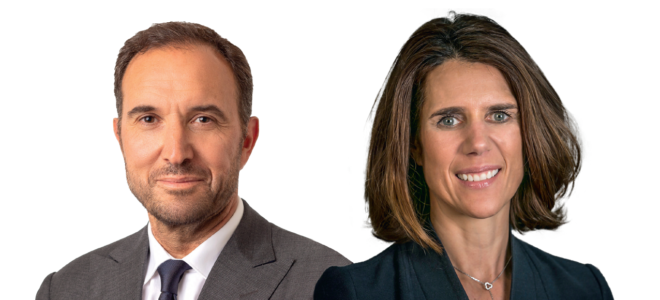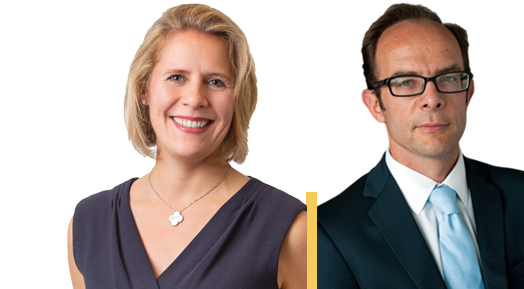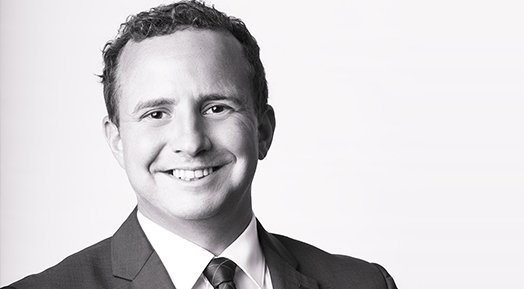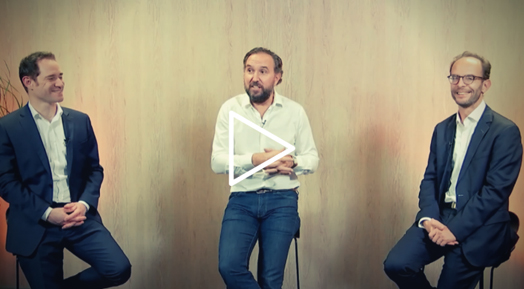BUILDING STRONG TIES #1
Joint interview with Christine Kolb and Lionel Scotto le Massese
Interview by Ondine Delauney, Nextstep

In February 2019, Generali announced its acquisition of a majority stake in Sycomore Factory SAS, the controlling company of Sycomore Asset Management. This marked a decisive turn for Sycomore, a benchmark player in socially responsible investment (SRI) in France, 18 years after its creation. Review of a venture designed above all to be collective.
Sycomore AM was founded almost 20 years ago. How has the company developed?
Christine Kolb: There were five founding partners and we had all previously worked together at Banque du Louvre. We took a daring step in 2001 and founded Sycomore AM, which invests exclusively in listed companies. Our collective venture is based on a balanced partnership between the founders and on our complementary skill set. Independence is a key factor in this business project, and not only in terms of shareholding, but also in the vision we have of our profession. Right from the start, we adopted a responsible investor approach based on a proprietary business analysis model which forms the backbone of our management. We believe that merely reading an income statement or balance sheet is not enough to understand the drivers of a company’s sustainable performance. So we included nonfinancial environmental, social and governance (ESG) criteria in our fundamental analysis, because they impact a business’s economic and therefore stock market performance. For twelve years now, this pragmatic approach has been a commitment to our clients to focus our investments on virtuous companies as regards the environmental and social dimensions.
How were the employees involved in building the company?
Lionel Scotto: I have supported the founders of Sycomore since the start of their venture and I now feel almost like a member of the team. The company was founded just before11 September 2001, and the gamble looked impossible. But the founders never departed from their strategic vision as a responsible investor, or as a responsible employer to the staff. They believe that growth is only sustainable if it is shared within the company. So, managers very soon gained access to the capital by coinvesting, with possibilities of accretion at set periods and according to predefined goals. And the recurrence of these incentive schemes is quite unique. There had already been three on the trot and a fourth one was implemented when Generali invested. I suggested the technical aspects of the vehicle for each one. As of 2006, the employees co-invested via stock warrants with a possible accretion of 10%. As the venture continued, some prestigious partners came to support the company In February 2019, Generali announced its acquisition of a majority stake in Sycomore Factory SAS, the controlling company of Sycomore Asset Management. This marked a decisive turn for Sycomore, a benchmark player in socially responsible investment (SRI) in France, 18 years after its creation. Review of a venture designed above all to be collective. and, every time, we gave the employees the opportunity to reinvest a part of their stake with a new incentive plan. In 2012, the level of access to the capital was raised to 20%. In 2019, when Generali acquired the majority stake, the founders deducted the future dilution of the fourth plan from their sale price, to allow the teams to continue benefitting from stockbased incentive plans. This virtuous approach has no doubt helped to stabilise the teams over the long term.
C.K.: The aim of our approach is two-fold: we not only seek to align interests, but also to preserve the teams’ entrepreneurial spirit. Today, almost half of Sycomore’s employees are company shareholders. We have broadened the circles to key people, based on criteria pertaining to competency, loyalty and commitment.
How did the negotiations take place with Generali?
C.K.: In 2018, we initiated a process to find a partner who would give us the means to pursue our ambition. We wanted the process to be kept short – the deal was signed in just three and a half months – because the inherent uncertainty always destabilises a business. In addition, Sycomore’s strength lies in its agility and by opting for a tight timeframe were we able to test the partner’s responsiveness. With Generali, we soon reached an agreement on the principles of our partnership. Admittedly, it’s a majority deal in terms of capital, but Sycomore has retained a lot of independence in various key areas such as branding and positioning, company strategy and development, and the management of our portfolios and teams. We also broadened the employee shareholding. However, Generali are involved in risk control and the company’s compliance. The support we received from Lionel Scotto and his teams was great, as he really knows Sycomore’s history well. We share the same entrepreneurial mindset and the same vision. He’s almost part of the family.
L.S.: With €6.4 billion of assets under management, the founders decided that Sycomore had reached a critical size. They then wondered about continuing the venture alone and facing the internationalisation, network and sourcing issues, or whether they should seek the support of a partner. The target appealed both to industrial players and financial sponsors. So we organised a competitive process, but they very soon opted for the industrial choice. Particularly because Generali met their expectations and were unbelievably agile. I thought that the bidding process aspect would be a disadvantage for Generali compared to funds, but in fact, they very quickly grasped all the sellers’ legitimate expectations and agreed to address the future aspects relating to shareholder agreements at the same time as the sale of shares. In the end, the price was a secondary matter compared to the total offer and Sycomore was able to keep up its momentum.
Isn’t it tricky continuing to run the company after selling the majority of the capital?
C.K.: I don’t feel like we sold Sycomore. Of course, Generali now owns the majority interest but the founders and teams are still significant shareholders. We have developed a strategic partnership with Generali. And it’s an important step for Sycomore’s development. Some things have obviously changed on a day-to-day basis. Reporting is more complex than before, but it’s an acceptable constraint. It’s something I insisted on during our negotiations: reporting must not be such a burden as to slow down our entrepreneurial projects. We actually have the freedom to take initiatives and they are then supported by our partner. So we can really see the benefits of the deal.
What’s the best way to structure the shareholders’ agreement to confidently organise the future relationship?
L.S.: We needed an agreement that transferred control of the capital and voting rights, while re-balancing natural shareholder rights. Today, the integrity of operational management is maintained and lies with the Sycomore team. The founders have retained control over growth prospects and the company’s development with an overriding vote in the event of a buildup project. Lastly, the incentive tools were integrated into the deal and remain in the hands of the founders. There is no set meeting point but the day the partners want to split, safeguards have been contractually agreed to ensure liquidity on exit for the employees. However, the agreement is relatively succinct and gives the founding team of lot of rights. That’s why they still feel “at home”, in a way. How did the employees react to the deal?
C.K.: Key individuals were involved in the process and attended the meetings with Generali. And the rest of the employees were regularly kept informed of the process. We were completely transparent and included them in the transaction, by offering some of them the opportunity to become shareholders in Sycomore.
L.S.: Transparency was implemented to avoid a misalignment between founders and managers, and it was actually quite easy to reconcile the two. The aim is to continue offering incentives to as many key people as possible for the next phase starting with Generali. As the capital framework is restricted this time, we are going to use free incentive tools. For some, the 2019 deal was a turning point thanks to the financial changes it brought.


